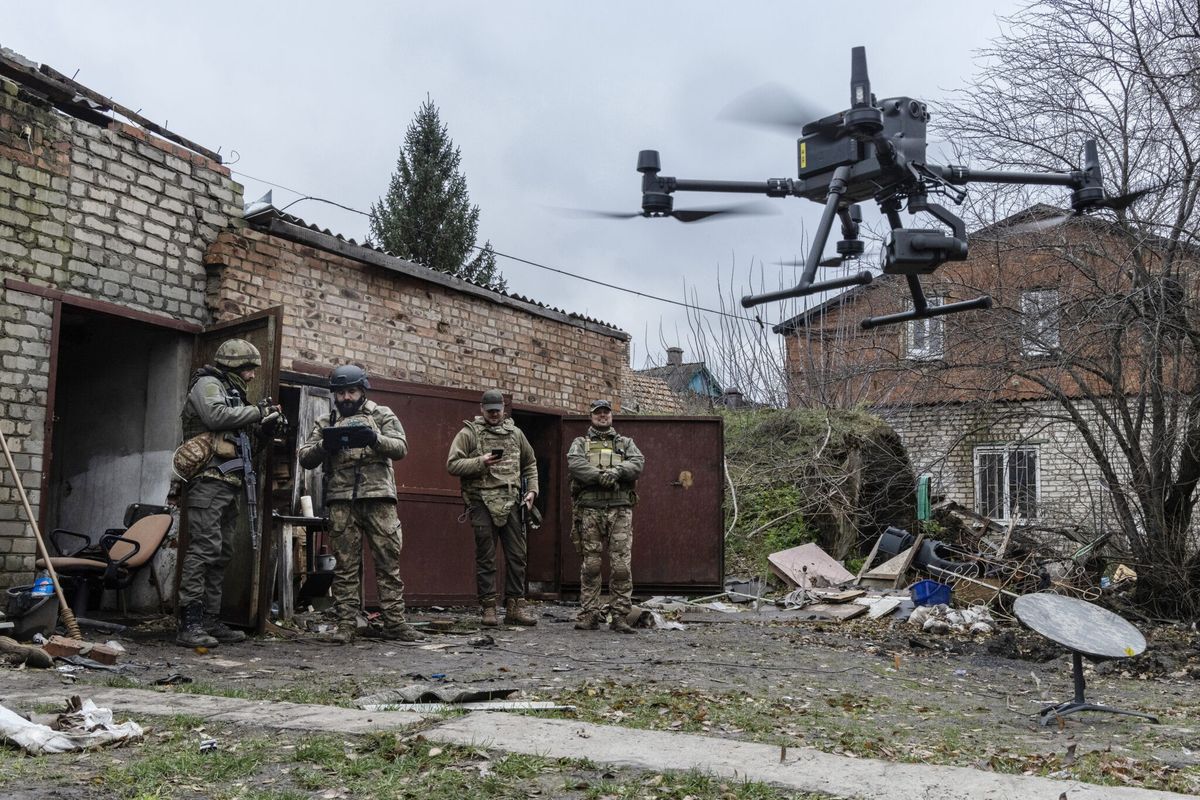OPINION — “We have been focused on expanding the capacity of the industrial base for some time. What's in that supplemental? As I said earlier, there's — there are monies in that supplemental that enable us to do that. And in our industrial base, as I have engaged the leaders of many of the companies, they are digging in and moving out and looking for ways to shorten production times and expand capacity.”
That was Defense Secretary Lloyd Austin speaking to the Pentagon press last Thursday, following a virtual meeting of the Ukraine Defense Contact Group.
While the main public focus of the $95 billion National Security Supplemental Appropriation Act of 2024 – the bill that became law last Tuesday n– has been on military aid to Ukraine, Israel and Taiwan, the fact is a substantial amount of those funds is going to build up the arms production infrastructure in the U.S.
President Biden described it this way: “We’re sending Ukraine equipment from our own stockpiles, and then we’ll replenish those stockpiles with new products made by American companies here in America: Patriot missiles made in Arizona, Javelins made in Alabama, artillery shells made in Ohio, Pennsylvania, and Texas. In other words, we’re helping Ukraine while at the same time investing in our own industrial base, strengthening our own national security, and supporting jobs in nearly 40 states all across America.”
Before describing the billions in the bill for the U.S. military industrial base, I must add that the supplemental also is paying for American military personnel who are participating both directly and indirectly in the fighting in Ukraine and the Middle East and Gaza.
The Ukraine package includes $11.3 billion “to support our service members in Poland and Germany who are helping our allies equip and train Ukrainian forces,” as Sen. Susan Collins (R-Maine) put it during floor debate last Tuesday.
The Israel package includes $2.4 billion to support the ongoing U.S. Central Command operations in the Middle East that are keeping vital shipping lanes open and protecting commercial ships from all over the world from Houthi attacks as they transit the narrow straits near the Red Sea. As Gen. Michael E. Kurilla, head of U.S. Central Command, told the Senate Armed Services Committee on March 7, “Our soldiers, sailors, airmen, Marines, guardians, and Coast Guardsmen are executing critical operations that contribute to the collective security of the U.S. and our partners. They operate in harm’s way each day.”
There is also an old-fashioned “Christmas Tree” element buried in the National Security Supplemental to include anti-drug packages to fight fentanyl and captagon, the latter a popular amphetamine in the Middle East, and even sanctions against Chinese online companies and Iranian government leaders which I will describe below.
Money for the U.S. defense industry
One of the less-publicized winners in the supplemental is the U.S. submarine-building industry. Nearly half the Indo-Pacific $8.1 billion funding, described as help for Taiwan, is directed to the U.S. submarine industry.
Some $2.15 billion under “Shipbuilding and Conversion, Navy,” is to remain available until September 30, 2028, to support improvements to the submarine industrial base. $1.96 billion of these funds are designated for the Columbia Class strategic ballistic missile submarine program, and another $200 million for the Virginia Class submarine program.
There is another $1.1 billion listed under “Operations and Maintenance, Navy,” “Other Procurement, Navy,” and “Military Construction, Navy,” all three to “support improvements to the submarine industrial base and for related expenses.”
Taiwan, by the way, gets $2 billion to purchase weapons through the Foreign Military Financing (FMF) program, and there is another $1.9 billion to replenish Defense Department (DoD) weapons stocks previously used to provide defense items to Taiwan.
The Indo-Pacific element also provides $250 million to the World Bank’s International Development Association’s Special Program to Enhance Crisis Response Window. That group provides zero-to-low-cost-lending to aid those harmed by severe natural disaster, public health emergencies or economic crises.
The $60 billion for Ukraine
The $60.84 billion Ukraine package includes $23.2 billion to replenish DOD weapons transferred to Ukraine from American military stocks, plus $13.8 billion for Ukraine to purchase U.S. weaponry. Hence President Biden’s point; this is money coming back to the coffers of American companies. There is another $9.5 billion in forgivable loans, $7.9 billion in economic assistance to Ukraine, and $1.6 billion in loans for assistance to countries in Europe and Asia.
One added element was $481 million for the Department of Health and Human Service’s Refugee and Entrant Assistance account, to aid Ukrainians displaced by Russia’s invasion. The funds would be used by HHS’s Office of Refugee Resettlement to provide resettlement assistance to Ukrainians who have arrived in the United States since September 30, 2023. They now will be eligible for time-limited cash and medical assistance, English-language education, job training, and other support services. Funds would be used to support Ukrainians arriving through the end of fiscal year 2024.
The State Department receives $300 million for “International Narcotics Control and Law Enforcement,” with the proviso that funds “may be made available to support the State Border Guard Service of Ukraine and National Police of Ukraine, including units supporting or under the command of the Armed Forces of Ukraine.”
The supplemental also provides an additional $8 million for the DoD Inspector General to conduct oversight of U.S. money and armaments delivered to Ukraine, which reflects congressional concerns about some money being diverted.
The Republican-controlled House Appropriations Committee, in its summary of the Ukraine funding, focused on reporting provisions that require an accounting “for U.S. defense articles that require enhanced end-use monitoring to ensure such articles reach their intended recipients and are used for their intended purposes.”
Among the reporting requirements to congressional committees is one that calls on the Secretaries of Defense and State to describe “any occurrences of articles that did not reach their intended recipients or were not used for their intended purposes and a description of any remedies taken.”
Congress also put into the supplemental a requirement that the Secretaries of State and Defense produce, by early June, “a strategy regarding United States support for Ukraine against aggression by the Russian Federation,” that some House and Senate members have sought for more than a year.
The legislation specifies that the strategy “shall be multi-year, establish specific and achievable objectives, define and prioritize United States national security interests, and include the metrics to be used to measure progress in achieving such objectives including to help hasten Ukrainian victory against Russia’s invasion forces in a manner most favorable to United States interests and objectives, and a description of the national security implications for the United States if those objectives are not met.”
The strategy should also describe “how each specific aspect of U.S. assistance, including defense articles and U.S. foreign assistance, is intended at the tactical, operational, and strategic level to help Ukraine end the conflict as a democratic, independent, and sovereign country capable of deterring and defending its territory against future aggression,” and “include a classified independent assessment from the Commander, U.S. European Command, describing any specific defense articles and services not yet provided to Ukraine that would result in meaningful battlefield gains in alignment with the strategy.”
It should also have “a classified assessment from the Chairman of the Joint Chiefs of Staff that the provision of specific defense articles and services provided to Ukraine does not pose significant risk to the defense capabilities of the United States military.”
The funds for Israel
Of the $26.4 billion for Israel, $4.4 billion is to replace U.S. weapon stocks already transferred to Israel. There is also $4 billion to procure the Iron Dome and David’s Sling defensive systems against short-range rocket threats, plus $1.2 billion for the new Iron Beam missile defense system.
There is also $3.5 billion for the State Department’s Foreign Military Financing Program, of which up to $770 million can be used to procure Israeli-made defense articles or services. Grants for advanced weapons systems requested by Israel will only be those agreed to by the U.S., according to the legislation.
The Israeli package also includes $5.7 billion for humanitarian assistance, including the provision of emergency food and shelter for vulnerable populations and communities – Gaza being an obvious target for such funds - and another $3.5 billion for migration and refugee assistance to address the needs of vulnerable populations and communities.
Congress plans to monitor these funds, in part by giving the State Department Inspector General (IG) another $4 million and the United States Agency for International Development IG an added $3 million – both “for the oversight and monitoring of assistance made available for Gaza…and related programs.”
Beyond that, Congress ordered that in three months, and every three months thereafter, the Secretary of State, in consultation with the Director of National Intelligence and other heads of elements of the intelligence community, must file reports on the humanitarian aid to the appropriate congressional committees.
These reports, according to the legislation, shall assess “whether funds appropriated by this title and made available for assistance for the West Bank and Gaza have been diverted by Hamas or other terrorist and extremist entities in the West Bank and Gaza” and include “details on the amount and how such funds were made available and used by such entities.”
Adding to the “Christmas Tree”
To help gain votes for passage, a number of other pieces of legislation were added to the supplemental, giving it that “Christmas Tree” aura – as in, gifts for certain constituencies.
Most popular was the Fend Off Fentanyl Act, which declares that the drug fentanyl is a national emergency and enables the President to impose sanctions on fentanyl traffickers, and the U.S. Treasury to better fight fentanyl-related money laundering. It also adds a ten-year statute of limitations for any violations and calls for the Treasury Secretary to provide Congress with a classified report on actions taken by the Chinese government on “persons involved in the shipment of fentanyl, fentanyl analogues, fentanyl precursors, precursors for fentanyl analogues, and equipment for the manufacturing of fentanyl and fentanyl-laced counterfeit pills.”
The language in the supplemental would allow the proceeds from those seized assets of fentanyl narco-traffickers to be used by law enforcement in local communities to fight this fentanyl scourge.
Captagon, another amphetamine-type drug, whose precursor chemicals are produced illicitly in President Bashar al Assad’s Syria, is the focus of the Illicit Captagon Trafficking Suppression Act of 2023, which has become part of the supplemental.
Under the measure, which has been a project of Rep. French Hill (R-Ark.), sanctions are to be imposed on any foreign person who engages in illicit production and/or trafficking of captagon. “Now,” Hill said on April 24, “those directly involved with the proliferation of this dangerous drug will be targeted and sanctioned.”
Also added to the supplemental is the so-called Rebuilding Economic Prosperity and Opportunity for Ukrainians (REPO) Act, which prohibits the release of Russian sovereign blocked assets by the U.S., and gives authorization to the President – if he wants to use it — to “seize, confiscate, transfer, or vest” Russian state sovereign assets “for the purpose of transferring those funds to the Ukraine Support Fund.”
The REPO Act goes on, “To provide compensation for the damages caused by the Russian Federation’s internationally wrongful acts should be assessed by an international mechanism charged with determining compensation and providing assistance to Ukraine…The [U.S.] President should endeavor to facilitate creation of, and United States participation in, an international mechanism regarding the repurposing or seizure of sovereign assets of the Russian Federation for the benefit of Ukraine.”
Two other pieces of attached legislation are the Protecting Americans from Foreign Adversary Controlled Applications Act and the Protecting Americans’ Data from Foreign Adversaries Act of 2024.
The first requires TikTok to separate from Chinese-owned ByteDance within 270 days and protect American users' privacy and data, while mitigating risks of espionage and propaganda dissemination. The second makes it unlawful for a data broker to sell or otherwise make available identifiable, sensitive data of a United States individual to a foreign adversary government or an entity controlled by a foreign adversary.
There are other provisions attached to the Supplemental Act, such as sanctioning those involved in financing Hamas and other Palestinian terrorist groups; strengthening tools to counter the use of human shields; and confronting asymmetric and malicious cyber activities.
The main point, however, remains: This is what it took for Congress finally to pass legislation that will provide funds needed months ago by Ukraine to fight its war against invading Russian forces.
The Cipher Brief is committed to publishing a range of perspectives on national security issues submitted by deeply experienced national security professionals.
Opinions expressed are those of the author and do not represent the views or opinions of The Cipher Brief.
Have a perspective to share based on your experience in the national security field? Send it to Editor@thecipherbrief.com for publication consideration.
Read more expert-driven national security insights, perspective and analysis in The Cipher Brief














